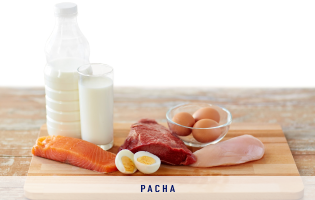5.04.2023
Proper Nutrition and Protein During Ramadan

The month of Ramadan is a time when the dietary and lifestyle habits of fasting individuals undergo significant changes. To sustain adequate and balanced nutrition during this period, it is crucial to complete at least two meals during the non-fasting hours of the day and not skip the pre-dawn meal, known as sahur. It is essential to ensure that the body receives the necessary nutrients between iftar (the evening meal that breaks the fast) and sahur. The balance in the diet during this period is of great importance as the limited time for consuming food must meet the body's nutritional requirements.
For this reason, dietary habits, especially protein intake, become significant during this period. Protein is a vital nutrient that forms the structure of muscles, tissues, and cells in the body. Adequate protein intake during Ramadan can help prevent muscle loss and support a healthy fasting experience.
While fasting, the limitations on eating and drinking throughout the day can lead to inadequate protein intake. Therefore, it is important to consume foods rich in protein during iftar and sahur meals. Sources of protein include meat, poultry, fish, eggs, dairy products, legumes, and nuts. These foods provide the necessary amino acids for the repair and growth of muscles in the body.
Consuming protein regularly during the month of Ramadan can help prevent potential muscle loss. Additionally, protein consumption is known to increase the feeling of fullness, reducing the need for overeating during iftar and sahur meals. However, excessive protein intake can also lead to health problems. People with kidney problems, in particular, should be cautious about their protein intake. Therefore, it is important to consume an adequate amount of protein during Ramadan but not to overdo it.
Lastly, in Ramadan nutrition, the consumption of fluids and their quality are also important alongside solid food components. As a result of increased body temperature due to rising temperatures and humidity, the body's metabolism attempts to adapt to this new condition. Failure to consume enough fluids, especially in cases of increased sweating due to the effects of heat, can lead to water and mineral loss, resulting in health problems such as fainting, nausea, and dizziness.
It is essential to drink at least an average of 2-2.5 liters (12-14 glasses) of water per day, and in addition to this, care should be taken to consume liquids that can meet the fluid requirements during the month of Ramadan. These can include but are not limited to buttermilk, freshly squeezed fruit and vegetable juices, plain soda, etc.
References:
- TÜBER (Turkish Food and Agriculture Business Association)
- www.tarim.gov.tr (Turkish Ministry of Agriculture and Forestry)
ńįlgili √úr√ľnler
